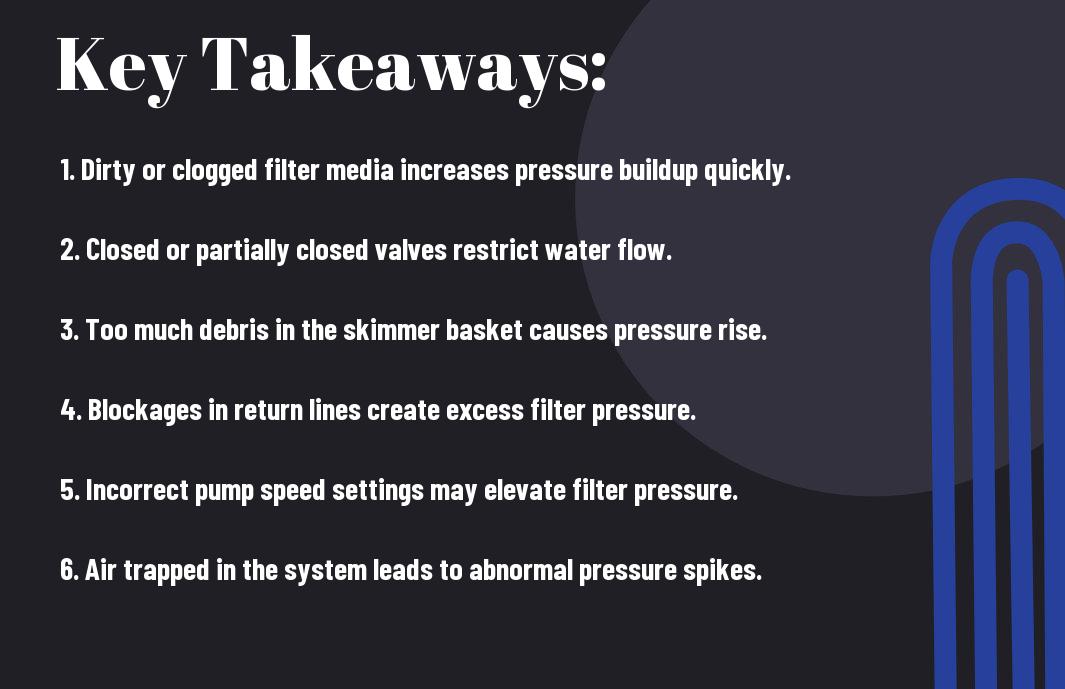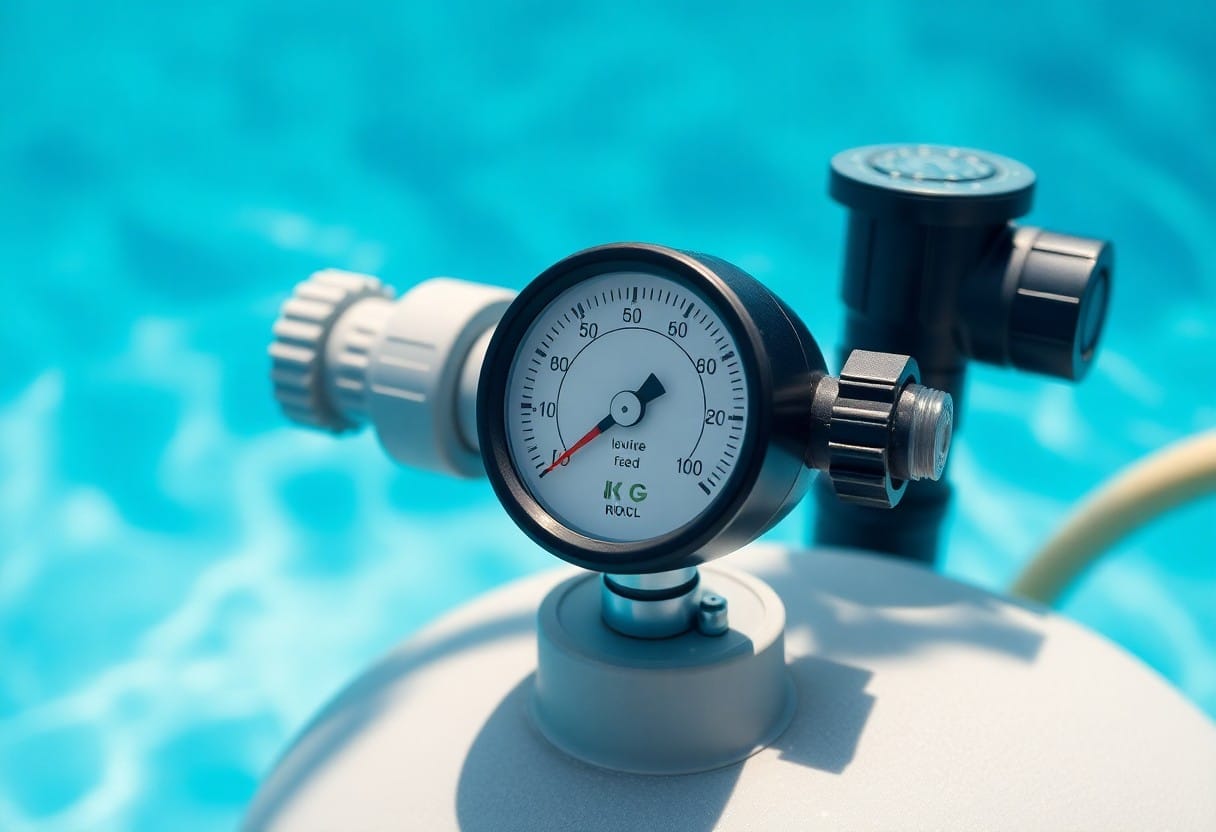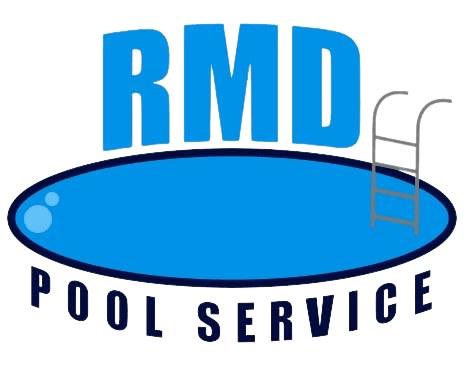Pressure in your swimming pool filter system can indicate several underlying issues that may need attention. If you notice that the pressure gauge is reading higher than normal, it’s important to understand the potential causes. This post will guide you through the common reasons behind high filter pressure, such as clogged filters, dirty skimmer baskets, or pump issues, helping you maintain the efficiency and cleanliness of your pool water.

The Physics of Pool Filtration Pressure
Understanding the physics behind pool filtration pressure involves examining how different forces interact within your system. Filtration pressure depends significantly on factors like flow rate, the resistance imposed by filters, and the mechanics of the pump immersing water through your pool’s plumbing. A balance between these forces is crucial for a well-functioning pool, where too much pressure can lead to operational inefficiencies and potential damage over time.
Understanding the Mechanics: Flow Rate and Resistance
Flow rate measures how quickly water moves through your filtration system, while resistance refers to obstacles the water encounters, such as dirt, debris, or clogs in the filter. High resistance forces the pump to work harder, resulting in increased pressure. If your filter has become dirty or blocked, the resistance rises, leading to higher pressure readings which can signal the need for maintenance or cleaning.
The Role of Pump Power and Size in Pressure Dynamics
Choosing the right pump size and power is fundamental to maintaining optimal filtration pressure. An undersized pump can cause excessive pressure buildup, while an oversized pump may lead to system inefficiency. The ideal pump should match the flow rate capacity required for your pool size, ensuring that water circulates efficiently without creating undue strain on the entire system.
For example, a typical residential pool might require a pump with a power rating between 1 and 1.5 horsepower (HP) to maintain a flow rate of 40-70 gallons per minute (GPM). If your pump is oversized, it might create higher pressure than your filter can handle, leading to premature wear and the risk of leaks. On the other hand, underpowered pumps struggle against existing resistance, adding to the pressure readings and slowing water circulation. Careful consideration of these dynamics will ensure your pool remains healthy and enjoyable.

Factors Contributing to Elevated Pressure Levels
Several factors can lead to high pressure levels in your swimming pool filter, disrupting your pool’s circulation system and water clarity. Understanding these culprits can streamline maintenance efforts and ensure optimal function. Common contributors include:
- Clogs or blockages in the plumbing or filter
- Dirty or worn-out filter media
- Poor circulation patterns in the pool
- Pump issues, such as an undersized or malfunctioning pump
- Excessive debris entering the pool, especially during windy seasons
This knowledge allows for effective troubleshooting.
Clogs and Blockages: The Silent Saboteurs
Clogs and blockages are often subtle yet powerful disruptors of your filter’s efficiency. When leaves, dirt, or other debris accumulate in the filter or plumbing, they restrict water flow, increasing pressure. Inspecting your pool regularly for physical obstructions and ensuring that skimmer baskets and pump baskets are clean can prevent these issues from escalating.
Filters: Types, Conditions, and Their Impact on Pressure
The type and condition of your filter significantly influence pressure levels. Various filter types, including sand, cartridge, and diatomaceous earth (DE) systems, each have unique maintenance requirements. Dirty or improperly maintained filters lead to increased pressure, reducing efficiency. Understanding the nuances of these systems is necessary for effective pool care.
| Filter Type | Pressure Impact |
|---|---|
| Sand Filter | When clogged, pressure rises sharply |
| Cartridge Filter | Proper cleaning maintains low pressure |
| Diatomaceous Earth Filter | Need regular backwashing to control pressure |
| New Filter | Initial pressure is typically lower |
| Old Filter | Generally leads to increased resistance and pressure |
- Different filter types require specific cleaning intervals to prevent high pressure.
Regular maintenance of these filters is key to ensuring your pool remains inviting and clean. Checking and replacing filter media, along with backwashing or rinsing as needed, helps maintain optimal pressure. Over time, adhering to cleaning schedules can save you both resources and repair costs.
| Maintenance Task | Frequency |
|---|---|
| Clean filter cartridges | Every 2-4 weeks |
| Backwash sand filters | Every 4-6 weeks or when pressure rises by 8-10 psi |
| Replace DE filter grids | Annually |
| Inspect all components | Monthly |
| Full system check | Seasonally |
- After addressing the filter type and maintenance, watch for changes in pressure levels.
Symptoms of a Malfunctioning System
High pressure in your swimming pool filter system can lead to a range of symptoms that may indicate a malfunction. You might notice an increase in water flow resistance, unusual noises from the pump, or sluggish filtration performance. Additionally, you may observe filtered water returning to the pool that appears cloudy, indicating that debris isn’t being adequately removed. Catching these symptoms early can help prevent further damage to your system and maintain optimal water quality.
Recognizing the Signs of High Pressure
Signs of elevated pressure often manifest as high readings on your pressure gauge, which should ideally sit between 10-20 PSI for most pools. A reading exceeding 25 PSI suggests your filter is under strain, commonly due to clogs or blockages within the system. You may also notice slower water turnover as the filtration system struggles to push water through impeded pathways.
The Effects on Water Quality and Circulation
High pressure can severely impact both water quality and circulation within your pool. When pressure builds, it can lead to insufficient water flow through the filter, causing dirt and debris to accumulate in the water. This reduced filtration efficiency can cause algae growth, cloudy water, and the potential for bacteria to thrive, ultimately compromising your swimming pool’s health.
Circulation issues also arise from abnormal pressure levels; your pool’s water doesn’t circulate effectively, leading to stagnant areas that are prone to dirt accumulation and algae formation. Proper circulation is vital for maintaining balanced chemical levels in your pool, ensuring that sanitizers work efficiently to keep the water clean. Regular monitoring of pressure readings and addressing problems early can help avoid these complications and preserve water quality while keeping your filtration system functioning smoothly.

Troubleshooting High Filter Pressure
Identifying the cause of high filter pressure involves a systematic approach. You can efficiently pinpoint the issue by thoroughly assessing various components of your filtration system, ensuring optimal operation and longevity.
Step-by-Step Guide to Diagnose the Issue
| Check the Pressure Gauge | Determine the current PSI and compare it with normal operating levels. |
| Inspect the Filter | Look for debris build-up or clogs that may restrict water flow. |
| Examine Skimmer and Pump Baskets | Clean out all baskets to ensure unrestricted water intake. |
| Review Water Chemistry | Test the water and adjust chemistry to prevent algae growth that can clog filters. |
| Confirm Plumbing Vents | Check for blockages in vent lines which can raise pressure levels. |
Maintenance Practices to Prevent Pressure Buildup
Implementing regular maintenance routines can significantly reduce the likelihood of high filter pressure. Scheduling consistent cleaning and water testing aids in keeping your filtration system operating efficiently.
Establish a regular cleaning schedule for your filter to clear out debris that can accumulate over time. Additionally, routinely check your skimmers and pump baskets to ensure they are free of blockages. Regular water testing is also fundamental; it allows you to maintain balanced chemical levels and suppress algae growth, which can lead to clogging. Lastly, consider replacing any worn or damaged parts promptly to maintain optimal filter performance. Following these practices ensures the longevity of your system, improving both efficiency and water quality.
When to Call in the Professionals
If your attempts to troubleshoot the high filter pressure yield no results, or if the pressure exceeds recommended levels consistently, it may be time to call in a professional. Professionals possess the expertise and equipment needed to fully diagnose complex issues such as pump malfunctions or internal blockages in the filter system that you might not be able to resolve alone.
Indicators that Require Expert Intervention
Several signs indicate that it’s time to seek professional help. If you notice persistent, unusually high pressure readings despite regular maintenance or you detect unusual noises from the pump, these are warning signals. An increase in debris accumulation in the filter or frequent need for backwashing also suggests a more significant problem that requires an expert’s assessment.
The Cost-Benefit Analysis of Professional Help
Engaging a professional may seem like an additional expense, but it often saves time and money in the long run. The cost of missing out on imperative repairs can lead to more severe damages, potentially costing you thousands in repairs down the line. Additionally, a professional can help ensure your system runs at optimal performance, reducing energy costs and improving the lifespan of your equipment.
The financial implications of hiring a professional go beyond immediate costs. Regular maintenance and efficient repairs can reduce the long-term risk of system failure, which can compromise your pool’s safety and enjoyment. You might spend around $200 to $400 for a service visit, whereas an emergency pump replacement could run upwards of $1,500. Thus, weighing upfront costs against potential future savings on repairs makes hiring an expert a wise investment.
Summing up
Taking this into account, high pressure in your swimming pool filter can indicate problems such as a dirty filter, blockages in the plumbing, or issues with your pump. Regular maintenance, including cleaning or replacing the filter and checking for obstructions, is imperative for optimal performance. By addressing these issues promptly, you can help maintain your pool’s cleanliness and ensure a more enjoyable swimming experience.
